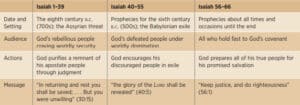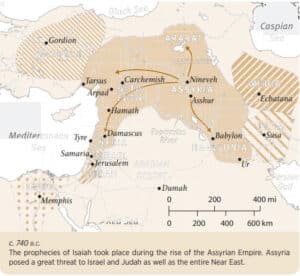The Background of Isaiah
1
Author and Date
Isaiah was called to his prophetic ministry “in the year that King Uzziah died” (Isaiah 6:1), around 740 BC He lived long enough to record the death of Sennacherib (Isaiah 37:38), in 681. However, most of the book can be dated only in very general terms because few specific dates are given.
2
Theme
The central theme of the book is God himself, who does all things for his own glory (Isaiah 48:11). Isaiah defines everything else by how it relates to God: is it rightly related to him as the center of all reality (Isaiah 45:22–25)? God’s people find strength only as they rest in the promises of their God (Isaiah 30:15). They find refreshment only as they delight themselves in his Word (Isaiah 55:1–2). To serve his cause is their worthy devotion (ch. 62), but to rebel against him is endless death (Isaiah 66:24).
3
Simplified Overview of Isaiah

4
Key Themes
1. God is offended by religious practices that come from an empty heart or a careless life (Isaiah 1:10–17; 58:1–12; 66:1–4).
2. God’s true people will someday become a multinational community of worship and peace that will last forever (Isaiah 2:2–4; 56:3–8; 66:18–23). They will be the predominant culture of a new world (Isaiah 14:1–2; 41:8–16; 43:3–7; 60:1–22).
3. God opposes human pride (Isaiah 2:10–17; 13:11; 23:9).
4. The foolish idols that man creates are destined for destruction (Isaiah 2:20–21; 44:9–20; 46:1–7).
5. God’s judgment will reduce Israel to a remnant. From this remnant he will raise up a holy people (Isaiah 1:9; 6:1–12:6; 40:1–2).
6. God sometimes judges people by making them deaf and blind to his saving Word (Isaiah 29:9–14).
7. The only hope of the world is in one man. He is the promised Davidic king (Isaiah 7:14; 9:2–7; 11:1–10), the servant of the Lord (Isaiah 42:1–9; 52:13–53:12), the anointed preacher of the gospel (Isaiah 61:1–3), and the victor over all evil (Isaiah 63:1–6).
8. God uses everything, even human sin, for his own glory (Isaiah 44:24–45:13).
9. All people are called to repent of sin and trust in God alone (Isaiah 12:2; 26:3–4; 32:17–18; 50:10; 66:2).
10. Often, when God’s people feel abandoned by him (Isaiah 40:27), they foolishly trust in worldly powers (Isaiah 31:1–3; 39:1–8).
11. God will vindicate his cause with a world-transforming display of his glory (Isaiah 11:10; 40:3–5; 52:10; 59:19).
12. God is guiding all of human history (Isaiah 41:1–4; 44:6–8; 46:8–11).
13. God’s faithfulness and the certainty of his final victory should motivate his people to pray and to be obedient (Isaiah 56:1–2; 62:1–64:12).
14. The wrath of God is to be feared above all else (Isaiah 9:19; 13:9, 13; 30:27; 34:2; 66:15–16).
5
Outline
I. Introduction: “Ah, Sinful Nation!” (1:1–5:30)
II. God Redefines the Future of His People: “Your Guilt Is Taken Away” (6:1–12:6)
III. God’s Judgment and Grace for the World: “We Have a Strong City” (13:1–27:13)
IV. God’s Sovereign Word Spoken into the World: “Ah!” (28:1–35:10)
V. Historical Transition: “In Whom Do You Now Trust?” (36:1–39:8)
VI. Encouragement for God’s Exiles: “The Glory of the Lord Shall Be Revealed” (40:1–55:13)
VII. How to Prepare for the Coming Glory: “Hold Fast My Covenant” (56:1–66:24)
6
The Near East at the Time of Isaiah

The Global Message of Isaiah
1
A God-centered Vision of All Things
Dating from the eighth century BC, and centering on God’s promises of protection, deliverance, purging, and restoration for his guilty and defiled covenant people, the book of Isaiah presents an incredibly rich landscape of salvation history in all its eternal and global scope. God has a purpose and plan, and his eternal decree will stand. It will be neither thwarted by strong and aggressive nations (Isaiah 14:26–27) nor derailed by unfaithful ones (Isaiah 1:4, 9). God has a message for the world that he created, and he declares without equivocation,
“I am God, and there is none like me, declaring the end from the beginning and from ancient times things not yet done, saying, ‘My counsel shall stand, and I will accomplish all my purpose.’” (Isaiah 46:9–10)
At the center of this global and eternal stage stands the Lord. He stands as the sovereign God (Isaiah 43:13), the Holy One of Israel (Isaiah 1:4; 5:19, 24; 10:20; 12:6; 17:7; 29:19; 30:11, 12, 15; 31:1; 37:23; 41:14, 16, 20; 43:3, 14; 45:11; 47:4; 48:17; 49:7; 54:5; 55:5, 60:9, 14), our redeemer (Isaiah 41:14; 43:14; 47:4; 48:17; 54:5), and the only Savior of the world (Isaiah 43:11).
2
Judgment and Salvation for All Nations
A Righteous God
God himself is our salvation (Isaiah 12:2; 17:10; 33:2, 6). He alone is “mighty to save” (Isaiah 63:1). He is incomparably great (Isaiah 40:25), and he is “holy, holy, holy” (Isaiah 6:3). The message of the book of Isaiah to the world begins with warning. Human pride and boasting are utterly foolish and a great danger before this righteous God (Isaiah 2:11–17; 10:33; 13:11; 16:6; 23:9; 28:1–4). Indeed, a day of judgment is coming (Isaiah 2:12–22, 24:1–23), so let all the nations of the earth take heed. Whether it is corporate greed, national pride, individual self-dependence, or Babel-like self-exaltation (Genesis 11:1–9), this is a message for our world today. Sin will not go unpunished. The sovereign Lord is watching.
A Saving God
But warning gives way to merciful promises of salvation. The message of the book of Isaiah to the world is that there is indeed a Savior, the Messiah, who has humbly, painfully, and gloriously won salvation for sinners and for all who would trust in him (Isaiah 4:2; 7:14; 9:6–7; 11:1–5; 42:1–4; 52:13–53:12; 61:1–3). Death itself is swallowed up, and our reproach is removed (Isaiah 25:8). What an astonishing salvation! There is no one in our world today too sinful to be saved, too hurt to be healed, too lost to be found, or too far away to be brought near. God, our Savior, is Immanuel, God with us (Isaiah 7:14). He saves. It is who he is.
A Global God
This salvation is for all nations. God’s promise to Abraham to bless the nations of the world (Genesis 12:1–3) is affirmed throughout the book of Isaiah. Even as the seraphim declare that “the whole earth is full of his glory!” (Isaiah 6:3), so it shall be, and so it is coming to pass even today, that the whole world will be filled with God’s glory (Habakkuk 2:14; Numbers 14:21; Psalm 72:19). In Isaiah 19 we read that one day even the hated nations of Assyria and Egypt, both of whom at some time enslaved Israel, will be included within God’s gracious purposes (Isaiah 19:16–25).
A Trustworthy God
Our confidence in our global missionary endeavor is not in our techniques, resources, or strategies. It rests instead upon the promises and faithfulness of God. As declared in Isaiah 25:5–7, the glory of the Lord will be revealed, and all mankind will see it; the feast of the Lord Almighty will be enjoyed by all peoples, and the veil of sin, ignorance, and death will be removed from all peoples and nations! No tribe, language, people, or nation will be excluded from the salvation of the Lord (Revelation 5:9). This is not the language of exaggeration. It is the declaration of the invincible determination of our almighty and trustworthy God (Isaiah 46:9–10).
3
Gospel Freedom and Proclamation to All Nations
A Divine Liberation
The gospel is a message of freedom to a world that is weary from bondage. So many among the nations are burdened—burdened by the relentless demands and empty promises of mankind’s religions, philosophies, and idols. Such things are “borne as burdens on weary beasts” (Isaiah 46:1). But God’s message to a weary world today is that, rather than being a burden to us, the Lord himself has borne his people; he has carried us from the womb, and will carry us to our dying day, finally saving us (Isaiah 46:3–5).
A Proclaimed Salvation
God’s people worldwide have the glorious privilege of proclaiming this message of freedom: “‘You are my witnesses,’ declares the Lord” (Isaiah 43:10, 12; see also Acts 1:8). Indeed, our very lives are an indispensable part of our witness that God uses to attract the nations to himself. As Christ taught, “By this all people will know that you are my disciples, if you have love for one another” (John 13:35). The glory and goodness of God is reflected in and through his people, by their words and by their actions.
A Fearless Proclamation
As we serve our God, make known his deeds among the peoples (Isaiah 12:4; 66:19), and herald the good news from high mountaintops (Isaiah 52:7), we are commanded not to fear (Isaiah 40:9). Because God is our salvation, we “will trust, and will not be afraid” (Isaiah 12:2). To those persecuted because of their witness to Christ around the world today, we have the great comfort of Isaiah 43:
“When you pass through the waters, I will be with you;
and through the rivers, they shall not overwhelm you;
when you walk through fire you shall not be burned,
and the flame shall not consume you.” (Isaiah 43:2)
God will protect, renew, and restore his global people. Our assurance rests in his deeply comforting words to us:
“Because you are precious in my eyes,
and honored, and I love you,
I give men in return for you,
peoples in exchange for your life.” (Isaiah 43:4)
He has proven this love in an ultimate way by sending us his Son to give his life in exchange for ours.
4
A Message of Cosmic Significance
We have a glorious message to proclaim to the world. We are to be “beautiful feet” bringing good news of happiness and salvation to the nations (Isaiah 52:7). We are privileged and called to “walk in the light of the Lord” (Isaiah 2:5). We are to present to the world the open invitation of God—the invitation for cleansing and forgiveness (Isaiah 1:18). The invitation to receive compassion, feeding, care, and life (Isaiah 55:1–3). The invitation to seek the Lord and turn from our wicked ways (Isaiah 55:6–7).
With joy we will draw water from the wells of salvation (Isaiah 12:3), and on that day we will all say,
“Give thanks to the Lord,
call upon his name,
make known his deeds among the peoples,
proclaim that his name is exalted.
“Sing praises to the Lord, for he has done gloriously;
let this be made known in all the earth.” (Isaiah 12:4–5)





